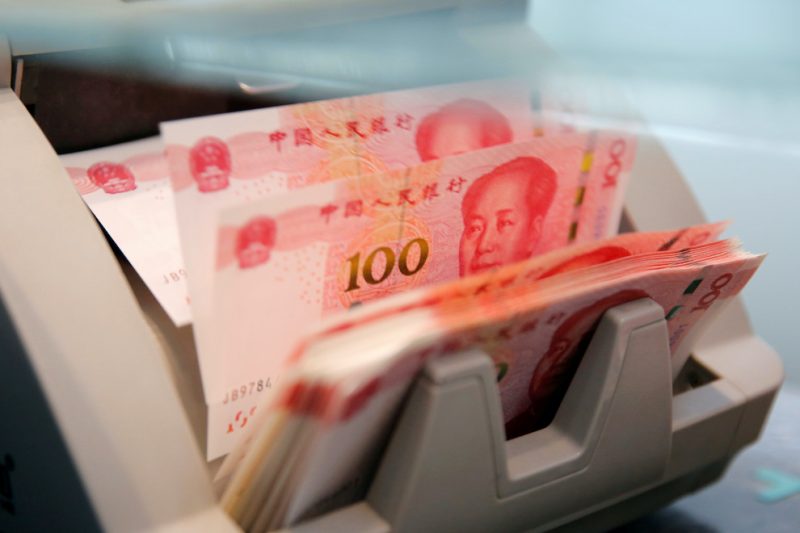New bank lending in China fell more than expected in July and broad credit growth was slower – factors that analysts say do not bode well for the economy in the second half.
Covid lockdowns, concern about jobs and the intensifying property crisis have hit confidence and made consumers loathe to take on more debt.
Chinese banks extended 679 billion yuan ($101 billion) in new yuan loans in July, less than a quarter of June’s amount and well short of analysts’ expectations, data released by the People’s Bank of China (PBOC) showed on Friday.
“Credit growth dropped back last month, with property market jitters weighing on bank lending,” Capital Economics said in a note. “It may continue to disappoint in the near-term given that sentiment among homebuyers is likely to stay weak and government borrowing is on course to slow.”
Analysts polled by Reuters had predicted new yuan loans would fall to 1.1 trillion yuan in July, versus 2.8 trillion the previous month and 1.08 trillion a year earlier.
Household loans, including mortgages, fell to 121.7 billion yuan in July from 848.2 billion in June, while corporate loans slid to 288 billion yuan from 2.2 trillion.
ALSO SEE: Five Big China State-Owned Companies to Delist from NYSE
Widespread Lockdowns
China’s economy slowed sharply in the second quarter as widespread lockdowns hammered demand and business activity, while the property market has lurched from crisis to crisis.
China’s top leaders recently signalled they were prepared to miss the government growth target of around 5.5% for 2022, which analysts said had been looking increasingly unattainable.
The PBOC reiterated it would step up implementation of its prudent monetary policy and keep liquidity reasonably ample, while closely monitoring domestic and external inflation changes, it said in its policy report.
But few China watchers now expect cuts in benchmark lending rates, which could raise the risk of capital flight as other major central banks sharply raise rates to battle surging inflation.
Stalled Projects
In the real estate market, a growing number of homebuyers have threatened to stop repaying mortgages on hundreds of stalled projects. While regulators have urged banks to help provide funds to fill developers’ funding gap, confidence in the sector remains fragile.
Data firm China Beige Book International, which conducts monthly surveys of more than 1,000 firms, said there was a clear drop in credit demand in July from manufacturing and services firms, with a slight increase in retail, which it attributed largely to fears of more lockdowns.
Some analysts point to a recent glut of liquidity in interbank money markets as a further sign of weaker credit demand.
Broad M2 money supply grew 12% in July from a year earlier, the central bank data showed, above estimates of 11.4% in the Reuters poll.
Outstanding yuan loans grew 11% compared with 11.2% growth in June. Analysts had expected growth unchanged from June.
Growth of outstanding total social financing (TSF), a broad measure of credit and liquidity in the economy, slowed to 10.7% in July from 10.8% in June.
TSF – or aggregate financing – includes off-balance sheet forms of financing that exist outside the conventional bank lending system, such as initial public offerings, loans from trust companies and bond sales.
In July, TSF dipped to 756 billion yuan from 5.17 trillion in June. Analysts polled by Reuters had expected July TSF of 1.30 trillion yuan.
Double Whammy
“Actually, if we adjust for the surging new bill financing to 314 billion yuan from 177 billion yuan a year ago, real credit demand may be even weaker than those headline numbers,” Nomura chief economist Ting Lu commented in a note, which said the weak credit data “do not bode well for H2”.
While markets had been optimistic about a recovery in the second half, Nomura believed policy support would be “too little, too late and too inefficient”, the Nomura analyst said, given the economy faced a “double whammy” from a potential downswing of the Covid business cycle and the deteriorating property sector.
Local governments issued a net 3.4 trillion yuan in special bonds in the first six months – part of the 2022 special bond quota of 3.65 trillion, finance ministry data showed, as authorities sought to quicken infrastructure spending.
Sources said that China plans to bring forward some 2023 local special bond quotas to the fourth quarter.
- Reuters with additional editing by Jim Pollard
ALSO SEE:
China Bond Defaults Already Double 2021 Total – SCMP
China Tells Provinces to Issue Huge Amount of Bonds in June
Third of China’s Top Developers Could Default in 2022: Goldman
























